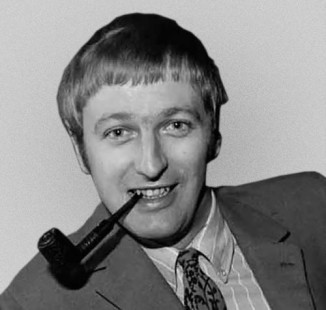Good News in History, January 8
50 years ago today, Ella Grasso became the first woman to be elected to serve as a state governor in the US. A member of the Democratic Party, Grasso served as the 83rd Governor of Connecticut, after two stints in the House of Representatives from 1970 to 1974. READ a bit about her tenure… (1975)
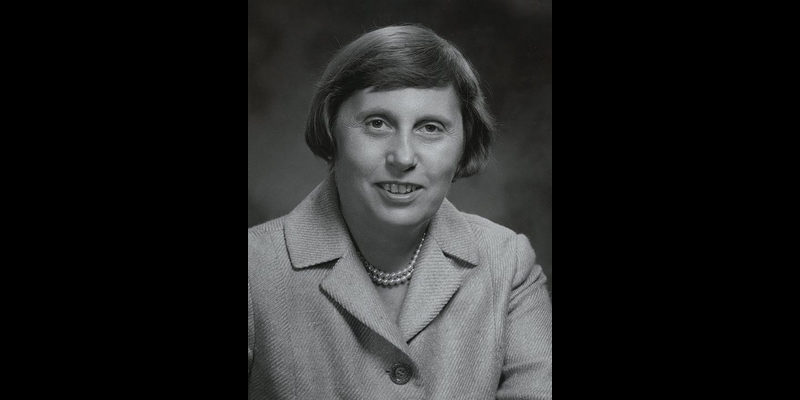
Upon taking office, Connecticut had an $80 million budget deficit so Grasso promised fiscal responsibility. In 1975 she laid off 505 state employees, decreased her promise of giving $25 million to cities with federal revenue sharing money to $6 million, returned to the state treasury a $7,000 raise she was legally required to take, and sold the state’s limo and plane.
A high point of her career was her decisive handling of a particularly devastating snowstorm in February 1978. Known as “Winter Storm Larry” and now known as “The Blizzard of 78” this storm dropped around 30 inches of snow across the state, crippling highways and making virtually all roads impassable.
She “Closed the State” by proclamation, forbade all use of public roads by businesses and citizens, and closed all businesses, effectively closing all citizens in their homes. This relieved the rescue and cleanup authorities from the need to help the mounting number of stuck cars and instead allowed clean-up and emergency services for shut-ins to proceed. The crisis ended on the third day.
MORE Good News on this Date:
- Monaco gained its independence (1297); French people voted to grant Algeria its independence after 7 years of a guerrilla war (1961)
- African-American men were granted the right to vote in Washington, D.C., despite President Andrew Johnson’s veto (1867)
- The African National Congress was founded (1912)
- David Bowie, the rock star who reinvented popular music with singles such as “Space Oddity” and “Starman” was born (1947)
- Bobby Fischer won the US Chess Championship at age 14 (1958)
- Russian cosmonaut Valeri Polyakov leaves for Mir, where he would stay on the space station until March 22, 1995—a record 437 days in space (1994)
202 years ago today, Alfred Russel Wallace was born. This geographer, naturalist, explorer, and illustrator is not well-known enough considering he conducted a neck-and-neck race with Charles Darwin over who would be entered into the history books for the first proponent of natural selection. Wikipedia sources say that Wallace’s 1858 paper on evolution and natural selection prompted Darwin to stop writing his “big species book” and quickly publish an abstract paper in 1859 entitled On the Origin of Species.
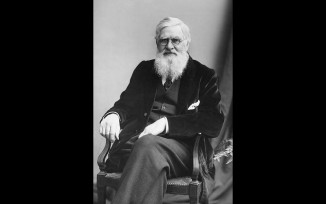
An Englishman born in Wales, a modest upbringing saw young Alfred Wallace study in London before having to work as a land surveyor to add income to the family. During this period he developed an interest in the natural world.
Inspired by the chronicles of earlier and contemporary traveling naturalists, Wallace decided to travel abroad. He later wrote that Darwin’s Journal and Alexander von Humboldt’s Personal Narrative were “the two works to whose inspiration I owe my determination to visit the tropics as a collector.
Wallace did extensive fieldwork, starting in the Amazon River basin. He then did fieldwork in the Malay Archipelago, where he identified the faunal divide now termed the Wallace Line, which separates the Indonesian archipelago into two distinct parts: a western portion in which the animals are largely of Asian origin, and an eastern portion where the fauna reflect Australasia.
Darwin and Wallace diverged very little according to their own writings and interpretations of each others’ work. The essential difference is that Darwin described natural selection as the pressure between individuals of the same species to reproduce, while Wallace described it as arising from environmental pressures to survive to reproduce.
Wallace’s 1904 book Man’s Place in the Universe was the first serious attempt by a biologist to evaluate the likelihood of life on other planets. He was one of the first scientists to write a serious exploration of whether there was life on Mars. (1823)
One of the most iconic men in science would have been 83 years old today. Despite being diagnosed at age 26 with ALS, Stephen Hawking lived long enough to transform the study of space forever, and like other great scientists before him has provided puzzles for the next generation to solve for years to come.
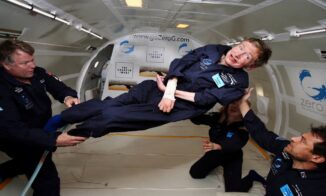
Stephen Hawking celebrates 65th birthday by floating in zero gravity aboard a special Boeing 727. The English theoretical physicist and cosmologist’s scientific breakthroughs included a prediction that black holes emit radiation, often called Hawking radiation. He was the first to set forth a theory of cosmology explained by a union of the general theory of relativity and quantum mechanics. He authored a popular science book, A Brief History of Time, which was on the Sunday Times’ best-seller list for a record-breaking 237 weeks. (1942)
Hawking, who died in 2018, had a rare early-onset, slow-progressing form of ALS that paralyzed him over decades until he used a single cheek muscle to communicate through a speech-generating device.
After cruising past a 2-months-to-live prediction from his doctor, in 1970, Hawking and longtime partner Richard Penrose published proof that if the universe obeys the general theory of relativity and fits any of the models of physical cosmology developed by Alexander Friedmann, then any hot Big Bang must have begun as a singularity in the same way as a black hole.
Other notable work by Hawking includes a potential explanation for dark matter, namely that the mysterious force we can’t see which makes up most of the mass in the universe is actually “primordial black holes,” which formed not through the collapsing of a star, but in the moments following the Big Bang. Only time will tell if his prediction is correct.
And, on this day in 1935, Elvis Presley was born in Tupelo, Mississippi. Musically inspired in a local church, he moved to Memphis with his mother, Gladys, and recorded his first song at age 19 for Sun Records.

He quickly became a chart-topping artist tapping a wide mix of influences across color lines, and the best-selling solo act in the history of recorded music.
Happy 92nd Birthday to Charles Osgood, the CBS ‘good news’ newsman, known for his folksy musings as the host of Sunday Morning for 22 years, and his daily radio show The Osgood File—one of the longest-running in the U.S.

Born in Brooklyn and characterized by his bowtie, he retired in recent years after a 45-year broadcasting career, which was spawned when he was attending Fordham University where Osgood volunteered at the campus radio station, and often played piano between tracks.
After graduating with a BS in Economics, he was hired as a classical radio DJ in Washington, D.C., but shortly afterward he enlisted in the military to become sn announcer—and part-time performer—with the U.S. Army Band. In 1963, he was hired as a cub reporter, writing features.
He’s the author of at least four books: Funny Letters from Famous People—which would have been a great holiday gift; A Funny Thing Happened on the Way to the White House (Humor, Blunders, and Other Oddities from the Presidential Campaign Trail); See You On The Radio; and an autobiographical account of his childhood in Baltimore. (1933)
[raw]
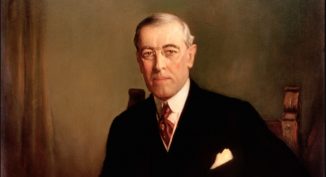
And, on this day in 1918, U.S. President Woodrow Wilson became a force for peace toward the end of World War I by proposing a list of principles to be used in negotiating a treaty between nations.
The Fourteen Points were outlined in a speech to Congress, and earned him the Nobel Peace Prize for his ‘Wilsonian idealism’. He translated domestic progressive ideals—free trade, open agreements, democracy, and self-determination— into a foreign policy that even the Bolshevik leader Vladimir Lenin viewed as a landmark of enlightenment in international relations. In the relatively short 1,200-word speech, Wilson directly addressed what he perceived as the causes for The Great War by calling for the abolition of secret treaties, a reduction in armaments, an adjustment in colonial claims to benefit both native peoples and colonists—and freedom of the seas (the absence of which became the reason the U.S. entered the European conflict).
The 28th president, Wilson also made proposals that would bolster world peace in the future. For example, he proposed the removal of economic barriers between nations, the promise of self-determination for national minorities, and a world organization that would guarantee the “political independence and territorial integrity of great and small states alike”—a League of Nations. The Fourteen Points carried such authority that they became the basis for negotiations of the Treaty of Versailles that ended the war, but because Wilson fell ill, France was able to advance key points in their favor, angering the Germans and fueling the rise of national socialism there.

And, 59 years ago today, The Beatles reached No.1 on the US album chart with the groundbreaking Rubber Soul. Their 7th chart-topping LP, it stayed on the Billboard list for 56 weeks, with album sales that were unprecedented. At the same time, their single ‘We Can Work It Out’ became the group’s 11th U.S. No.1 hit. Singer-songwriter Elvis Costello remembers the influence it had on those of his generation. An 11-year-old fan at the time, he recalls his initial reaction to the album: “‘I don’t like this, I think they’ve lost their minds’… I didn’t understand a word, I didn’t think it was any good—and then six weeks later you couldn’t live without the record. That’s when you trust the people who make music to take you somewhere you haven’t been before.”
Original US Track List for Rubber Soul: “I’ve Just Seen a Face”, “Norwegian Wood (This Bird Has Flown)”, “You Won’t See Me”, “Think for Yourself”, “The Word”, “Michelle”, “It’s Only Love”, “Girl”, “I’m Looking Through You”, “In My Life”, “Wait”, and “Run for Your Life”. (1966)
And, 85 years ago today, Graham Chapman, the English comedian, writer, actor, and founding member of Monty Python who gave up a looming medical career to become a comedian, was born. He was thought to be the best actor in the Python group, and played the lead role in two of their films, Holy Grail and Life of Brian. Also notable, he replaced the toaster in one of their most famous comedy sketches with a dead Norwegian Blue parrot. Watch some memorable moments from Chapman and Monty Python… (1941)
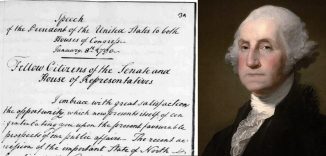
And, 235 years ago today, George Washington delivered the very first presidential State of the Union address to the nation. The speech, delivered in New York City within the first Senate Chamber was the first annual address given by a president of the United States—and it set the standard for what would become expected of presidents long after him.
The Senate body, headed by their president, was on his right, while the House of Representatives with their speaker was on his left. His demeanor gave the event the respect and importance that it has commanded since that first speech. Though it was the shortest State of the Union Address to date, with only 1,089 words, the Founding Father expressed “great satisfaction” with the cooperation in Congress “in the pleasing though arduous task of insuring to our fellow citizens the blessings which they have a right to expect from a free, efficient, and equal government.”
Unlike modern speeches, there were no details surrounding his points, but he outlined some of the challenges that their young America would face in order to secure her future. The country’s first chief executive, Washington wanted to create a competent army and to gather the resources needed to maintain one. “To be prepared for war is one of the most effectual means of preserving peace.” The army itself, its funding, supplies, and structure still needed to be determined so Washington included this in his speech because it needed to be addressed immediately.
The need for foreign policy was also a top concern and he promised to do his duty in the manner that “may render the most public good.” He also envisioned a naturalization process for foreigners to show how important they were to the country and to show the need that the nation had for new citizens.
President Washington also encouraged the advancement of agriculture, commerce, and manufacturing—and the promotion of science and literature. “Knowledge is in every country the surest basis of public happiness.” He reminded the country that they needed knowledge in order to be able to “know and to value their own rights; to discern and provide against invasions of them.” (1790)
SHARE the Milestones, Memories, and Music…
>read more at © GoodNews
Views: 1
